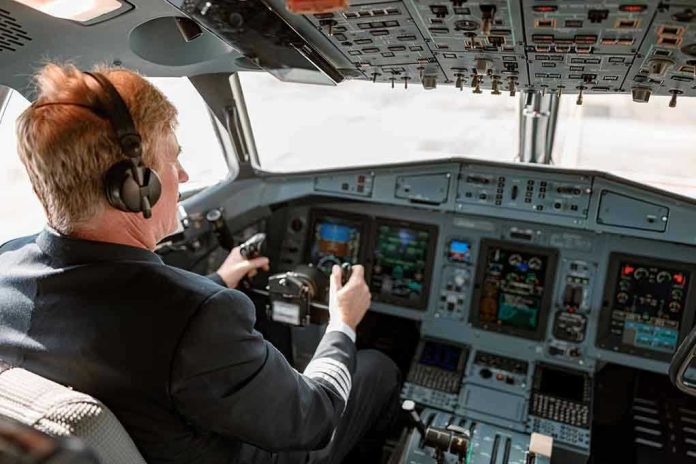
When lives hung in the balance, it was a pilot’s judgment—not artificial intelligence—that saved 469 people, and now he warns that unchecked automation could put future flights at risk.
Story Snapshot
- A veteran pilot saved 469 lives after an in-flight engine explosion, proving human expertise trumps automation in real crises.
- Richard de Crespigny, the pilot, now warns that increasing AI in cockpits may make flights less safe, not more.
- Despite catastrophic system failures, decisive human action—not automated systems—ensured a safe landing with zero fatalities.
- The incident reignites debate over the dangers of over-reliance on technology and the vital importance of skilled pilots.
Heroic Judgment Outshines Automation in Aviation Disaster
Richard de Crespigny, a decorated former airline pilot and ex-military officer, was at the helm of an Airbus A380 when disaster struck shortly after takeoff. The aircraft, already known for its heavy reliance on automation, suffered a catastrophic engine explosion caused by a manufacturing defect. Shrapnel ripped through the plane, triggering 21 critical system failures, 120 checklists, and the loss of half the aircraft’s network connectivity. In this moment of chaos, de Crespigny and his crew’s expertise—not computer algorithms—ultimately saved all 469 souls on board.
While the plane’s automated systems were designed to handle standard emergencies, they quickly became overwhelmed by the scale and complexity of the damage. The crew faced a barrage of conflicting alerts and malfunctioning controls, forcing them to constantly decide when to trust the technology and when to override it. The incident exposed a crucial reality: when the unexpected happens, only trained, experienced humans can synthesize complex information and make life-or-death decisions under pressure. The safe landing that day was not thanks to automation, but to human initiative and calm under fire.
The Perils of Over-Reliance on Cockpit Automation
In the aftermath, de Crespigny became a leading critic of the aviation industry’s push toward ever-greater automation and artificial intelligence. He argues that, far from making flying easier, unchecked automation can actually complicate pilots’ jobs. Automated systems are only as good as the scenarios they are programmed to handle, and in true emergencies—where multiple failures occur simultaneously—rigid algorithms can leave crews with more problems than solutions. His experience shows that pilots must have both authority and training to override computers when necessary, or risk disastrous outcomes.
Industry experts echo concerns about “automation complacency,” warning that over-reliance on computer systems erodes vital piloting skills. Incidents like United Airlines Flight 232 in 1989, where improvisation by the cockpit crew saved over 180 lives after a catastrophic mechanical failure, further highlight the irreplaceable value of human judgment. Conversely, tragedies such as TWA Flight 800 demonstrate that mechanical and human errors can be fatal when the crew is unable to intervene effectively. These real-world cases challenge the notion that more automation automatically equals more safety.
Lessons for America: Preserving Expert Oversight in High-Stakes Fields
The story resonates beyond aviation, serving as a cautionary tale for any sector rushing to replace human expertise with artificial intelligence. For conservatives concerned about government overreach, loss of personal responsibility, and the erosion of American common sense, the lesson is clear: technology should serve skilled professionals, not sideline them. De Crespigny’s warning is a call to uphold the American tradition of individual accountability and practical know-how, especially in fields where lives are on the line.
In a political climate where bureaucratic solutions and “one-size-fits-all” automation threaten to undermine freedom and competence, this pilot’s story is a reminder that true safety and progress depend on trained, empowered individuals—not faceless algorithms. As the aviation industry debates the future of AI, Americans should demand that those in charge never forget who really protects lives when routines break down: seasoned experts, not machines.
Ultimately, de Crespigny’s actions and advocacy underscore a vital conservative principle: real-world experience and personal responsibility cannot be replaced by technological shortcuts. As industries and policymakers grapple with the promises and pitfalls of artificial intelligence, the voice of those who have faced true crises—and prevailed—must not be ignored.















